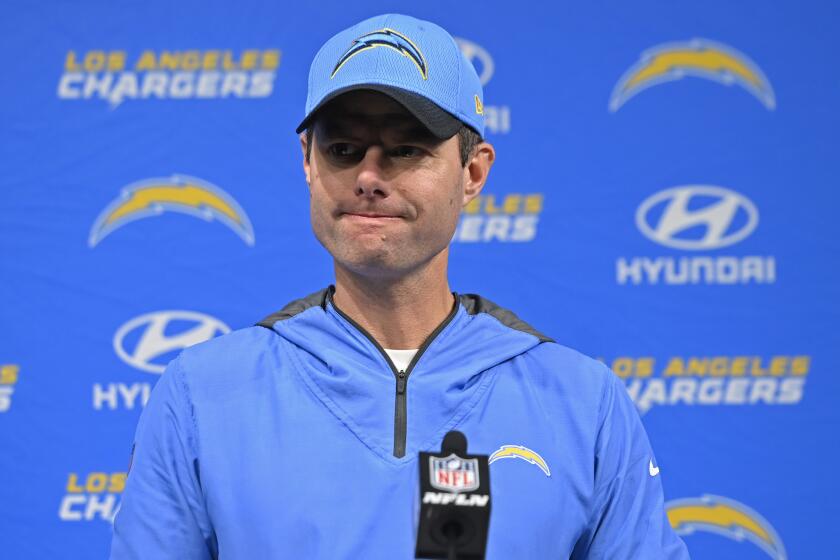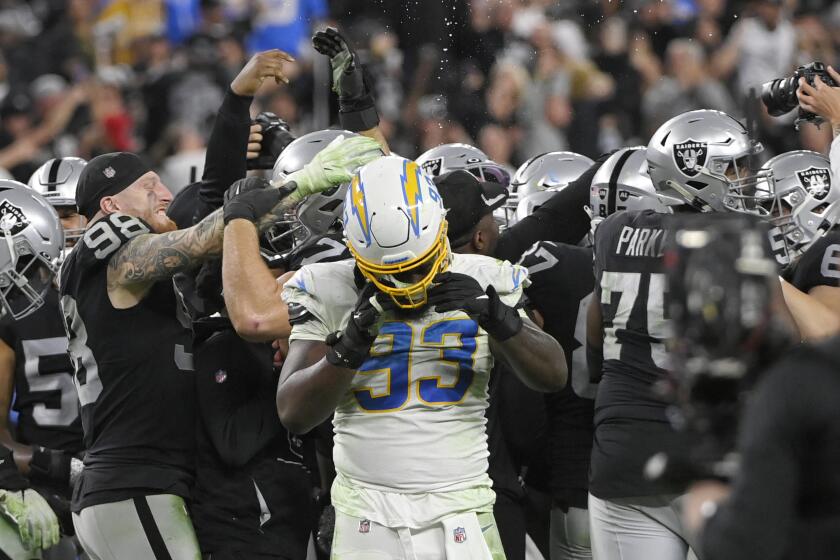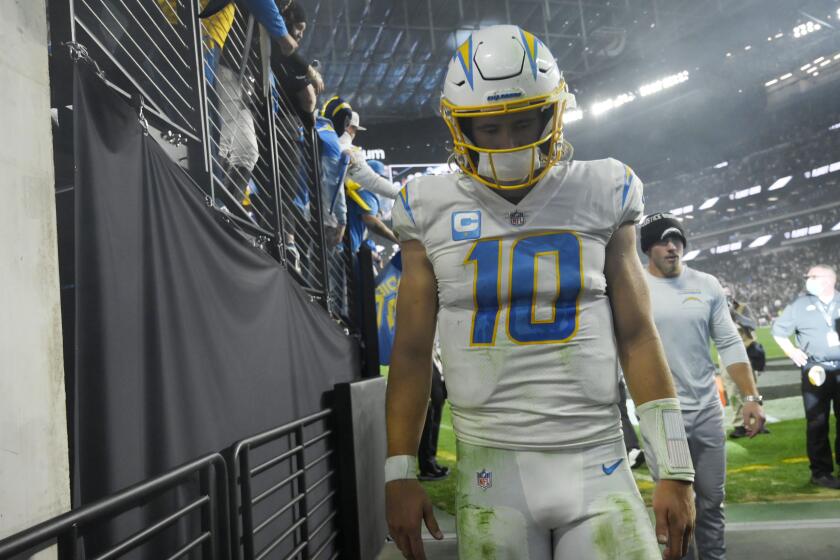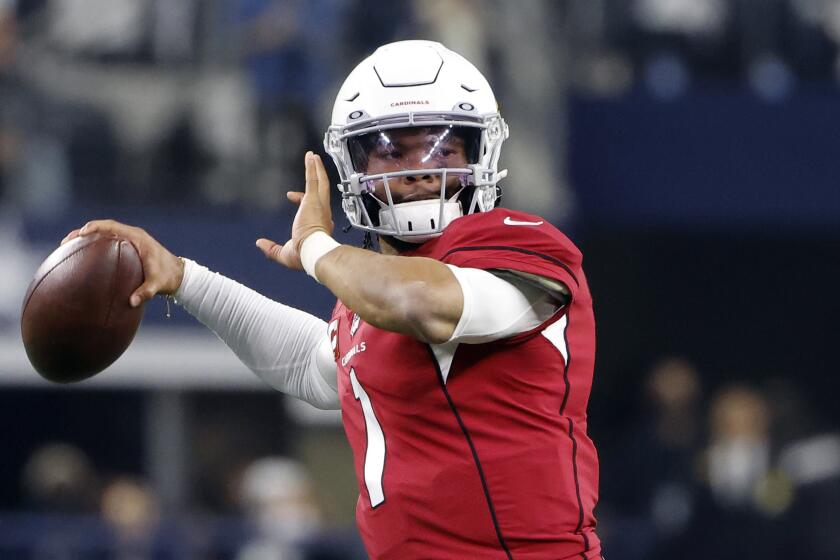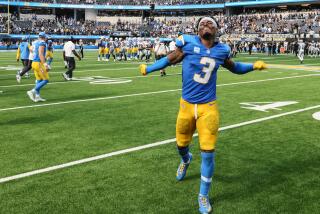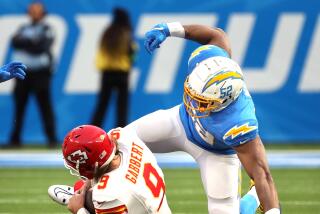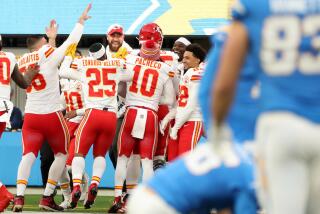NFL roundtable: Brandon Staley’s questionable calls kept Chargers out of postseason
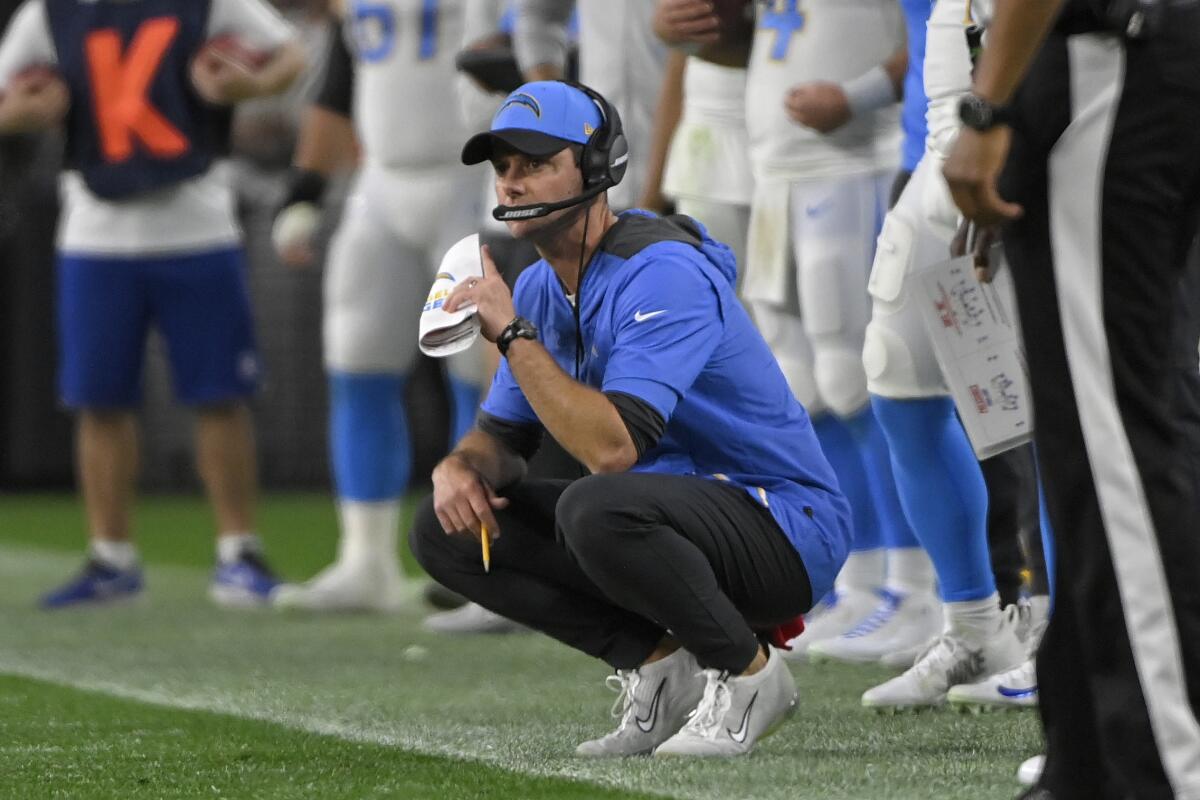
- Share via
The Chargers went to overtime in the last game of the season with a chance to qualify for postseason play in their first year under coach Brandon Staley. However, after a promising start to the season, the Chargers felt just short. Moderated by Times NFL editor Athan Atsales, Chargers beat writer Jeff Miller, Times NFL writer Sam Farmer, Rams beat writer Gary Klein, columnist Bill Plaschke and writer Mike DiGiovanna discuss what went wrong.
There were monumental moments through the Chargers-Raiders game. Yes, Staley’s philosophy all season has been to take chances, but what were you thinking when the Chargers went for it on fourth down from their 18?
Plaschke: I thought Brandon Staley had lost his mind. Then I remembered how he’s taken unnecessary risks before, failing three times on fourth down in a critical loss to Kansas City. Then I thought, wait a minute, this is a much bigger gamble, the biggest gamble of the season, going for it on fourth down FROM YOUR OWN 18-YARD-LINE!!!! Then I concluded, yeah, Brandon Staley had lost his mind.
DiGiovanna: I also was thinking, “What are they thinking???” Like Bill, I was not a fan of the Chargers passing up three makeable field goals to go for it on fourth down in a 34-28 overtime loss to Kansas City in Week 15, and I did not like Sunday night’s decision, either. I understand the analytics favor going for it on fourth down, but there is a time and a place. With so many one-score games in the NFL, how can you forego so many sure points, like the Chargers did against the Chiefs, and give up an easy three points like they did with that fourth-down decision against the Raiders?
Farmer: Not only that, but you’re not putting that situation in Justin Herbert’s hands? I didn’t get that at all. Yes, there’s upside to converting, but it’s vastly outweighed by the downside of failing to convert. It was an unsuccessful slap in the face of the Raiders, and it was like jet fuel to that crowd. To me, this was the dangling sweater thread that started the second-half unraveling.
The Chargers are surprised they did not qualify for the playoffs, but they still have admiration for the job done by rookie head coach Brandon Staley.
Miller: Staley will tell you his philosophy is not to take chances; it’s to seize what he likes to call advantage looks. At least one analytics site strongly recommended going for it on that play Sunday night. Staley often said during the season that he never felt like his decisions were gambles or examples of him being reckless. This case, to me, did feel like a gamble, even by Las Vegas’ gaudy standards.
Klein: Staley stayed true to his philosophy and formula. Unfortunately, for Chargers fans, it doesn’t always work.
I don’t think enough was made of that pass interference call before the half. To me, the ball landed almost 30 yards away from the receiver, meaning the pass was uncatchable. Plus, the receiver flopped to the ground. What’s your opinion?
Klein: Theatrics, like speed, route running and the abilities to create separation and gain yards after catches, are part of a modern-era NFL receiver’s toolbox. The good ones know how to sell it. That ball probably was not catchable, but it seems as if there are dubious pass interference calls in nearly every game.
Miller: But that ball did appear to be 100% uncatchable. The Chargers were on the short end of the play, no question. But veteran cornerback Chris Harris Jr. put himself in a bad position and it cost him. Derek Carr heaving the ball toward the goal line in that situation was pure savvy vet.
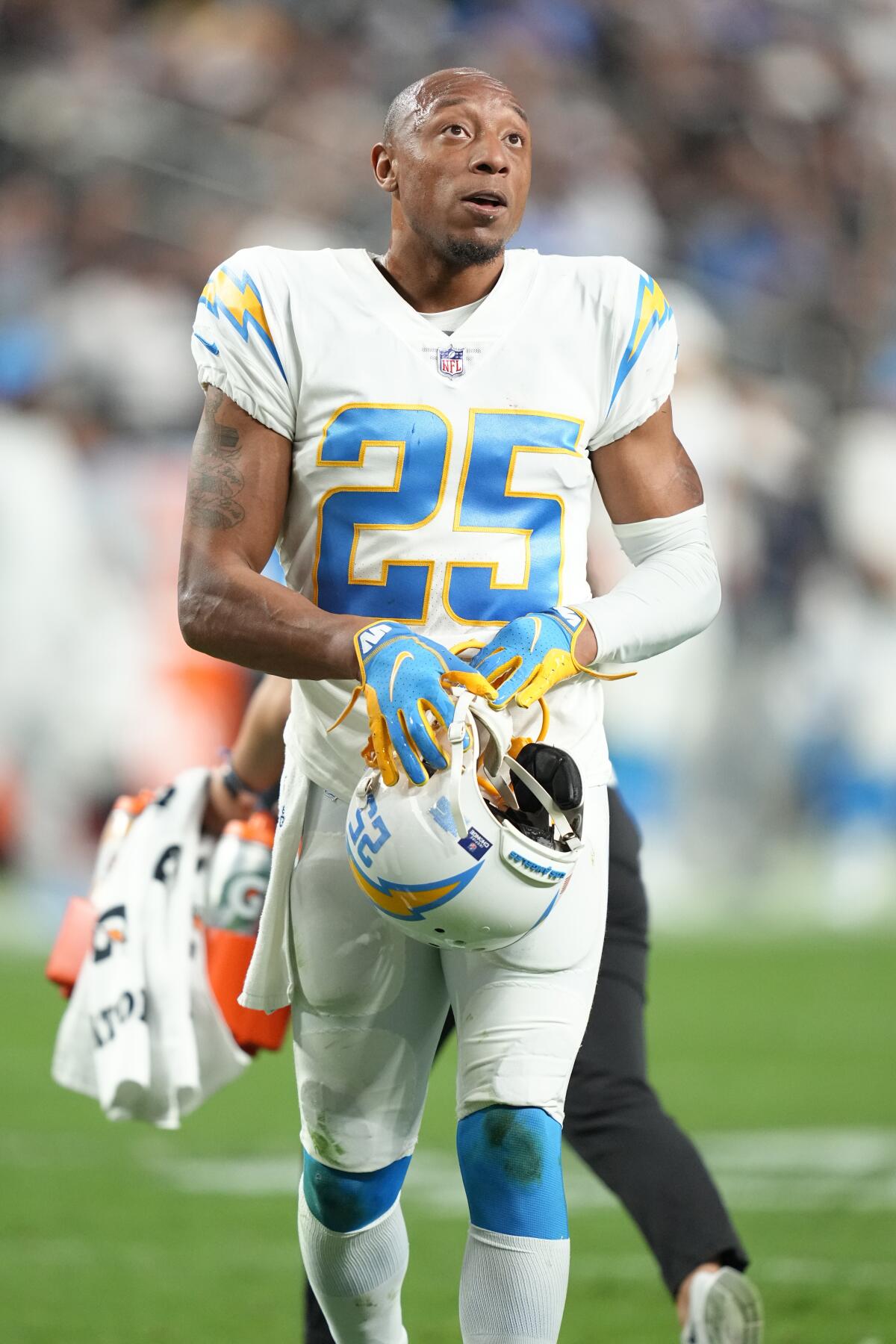
Farmer: That was almost comical considering how far away the ball landed and the dramatic soccer flop. There was contact by the defender, but defensive holding, five yards and an automatic first down, would be a much more reasonable call with an uncatchable ball. And that came right after the successful draw by the Raiders on third and 23. What a 1-2 gut punch.
Plaschke: Yes, when the Chargers defense was gashed for a long third-down run by Jalen Richard, I thought that was the biggest play on that drive. I was still vexed over that play when I saw the pass interference, which was a horrible call, but the defense should have been off the field by then. So I thought, bad call, but bad defense.
Before the deciding field goal, the Chargers called time out before third down. Then the Raiders gashed the Chargers defense for a first down to put them in field-goal range? What’s your opinion on Staley’s explanation?
Plaschke: I believe Staley when he said he wanted to change defensive personnel. But from my press box vantage point, judging body language and intensity and all that, the Raiders were laying down and waiting for the tie. So the timeout, no matter why it was called, gave the Raiders a little jolt and eventually cost the Chargers the playoffs.
Farmer: It was a strange timeout. The Raiders weren’t in a hurry-up offense, and you seemed to have the right personnel on the field. But there were prior mistakes, chiefly that failed fourth-down try in the third quarter, that were bigger head scratchers.
The Chargers failed to make the playoffs because of a dramatic overtime loss to the Las Vegas Raiders. Here are some observations from the 35-32 loss.
Klein: Did anyone really think the Raiders were going to let time run out so they could both go to the playoffs? C’mon. Staley’s explanation about getting the right defensive grouping on the field made sense. Of course, the second part would be executing that defense successfully and stopping the run. That didn’t happen.
Miller: Gary nailed this one. The Chargers were in their nickel defense and they suspected, correctly, that the Raiders were going to run for a third straight play. So Staley switched personnel groupings, inserting another defensive lineman. The real problem was that their run defense, an issue throughout the season, again failed them, this time with their season riding on it.
Yes, Justin Herbert is a stud but so are his receivers and Mike Williams is a free agent. How important is it for the Chargers to keep him alongside Keenan Allen? And can they afford it, salary-cap wise?
Klein: If I’m reading the chart right at overthecap.com, the Chargers have plenty of cap space. And Williams is a playmaker. I would not break up that tandem.
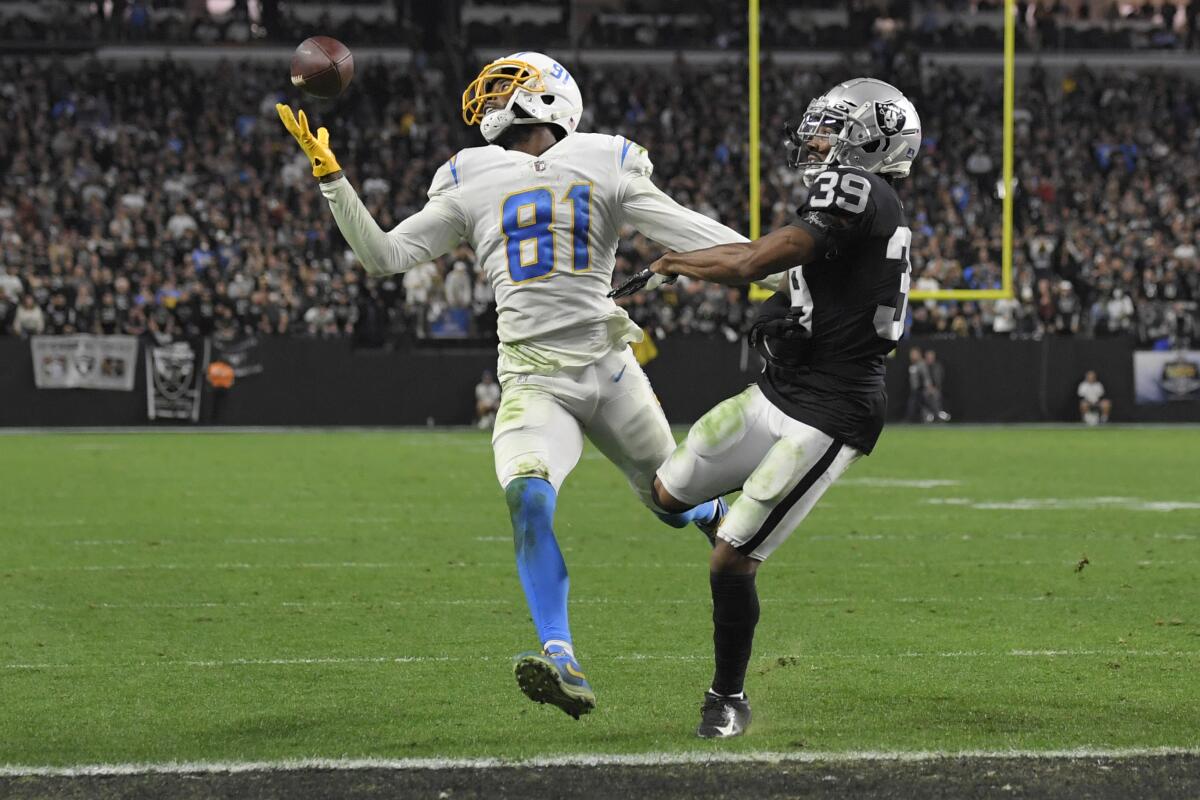
Miller: The Chargers already committed to Allen with a massive, long-term extension. Even with all that cap space, signing Williams to a big-time deal too would mean tying up a lot of money in one position. Williams could get franchise tagged, which would cost the Chargers about $18.5 million next season, according to Spotrac.
Plaschke: To me, Williams too often disappears. They can better spend the money elsewhere.
Farmer: Not sure about that. The Chargers have invested a lot of time and effort into Williams, transforming him from a guy who could rip down 50/50 balls into a well-rounded receiver and such an important part of Herbert’s arsenal. The Chargers have $72 million in cap space, second most in the league. Why shouldn’t they be able to keep him?
In hindsight, finishing 9-8 in the first season with a new coaching staff is fairly impressive for the Chargers. Did the season go better or worse than you expected?
Justin Herbert did everything he could to get the Chargers into the playoffs but it wasn’t enough to overcome a determined Raiders team and its fans.
DiGiovanna: Worse. I didn’t expect them to reach the Super Bowl, but with one of the NFL’s top five quarterbacks in Herbert, a versatile running back in Austin Ekeler, a deep and talented receiving corps and what seemed like an improved line, I thought the Chargers would be explosive enough to reach the playoffs.
Plaschke: Yes, worse. You have the best young quarterback, you need to make the playoffs.
Klein: Agreed. With Staley as the coach and Herbert as the quarterback, I thought the Chargers would make the playoffs. So, they fell below expectations. Given Staley’s success with the Rams, and granted he had Aaron Donald and Jalen Ramsey as cornerstones, I thought the Chargers’ defense would be better.
Farmer: First of all, 9-8 still sounds weird. Haven’t gotten used to a 17-game season. Although a winning season and coming so close to making the playoffs sounds good, it’s a disappointment. With a quarterback like Herbert, and some of the talent around him, the Chargers absolutely should be part of this expanded playoff field. That they’re watching from their couch is really a shame. The window is closing on building a team around an elite quarterback who’s playing on his rookie deal. Staley was supposed to come in and fix the defense, and there’s still a lot of work to be done. He seems like a very good coach, and I believe these transformations take time, but the Chargers left a lot on the table.
Miller: Before the season, I played the silly game where you go through the schedule and say, “Win, win, loss, win, loss...” I had the Chargers finishing 10-7, which I immediately decided was too optimistic. Back in August, I would have guessed 9-8 or 8-9 and that’s one of the few things I would have been right on regarding this team. How they reached 9-8 was not something I saw coming. I feel like the Chargers are still a year or two away from being big-time contenders. A little more roster building is necessary.
After a thrilling Week 18 of the NFL season, the playoffs are set. Here’s a breakdown of each first-round matchup and what to watch for next weekend.
What are the big holes the Chargers need to fill?
Plaschke: They need to find somebody to protect Herbert. They need to find a whole bunch of them.
DiGiovanna: I will defer to Jeff Miller on the particulars, but defense needs to be a priority too. The Chargers seem similar to the Rams in that they have several stars on defense — safety Derwin James and edge rusher Joey Bosa are among the league’s best at their positions — but they underperformed as a unit. The Chargers need to get more physical up front and tackle better at the second level. They ranked 30th against the run, yielding an average of 138.9 yards per game!
Miller: This team needs a right tackle. Like yesterday. Bryan Bulaga almost certainly won’t be back following two injury-filled seasons and his replacement, Storm Norton, struggled against the Raiders. Defensive tackle, right guard, tight end and cornerback are other areas of concern. The free-agent decisions include Williams, linebacker Kyzir White, edge rusher Uchenna Nwosu and defensive tackle Justin Jones.
More to Read
Go beyond the scoreboard
Get the latest on L.A.'s teams in the daily Sports Report newsletter.
You may occasionally receive promotional content from the Los Angeles Times.
